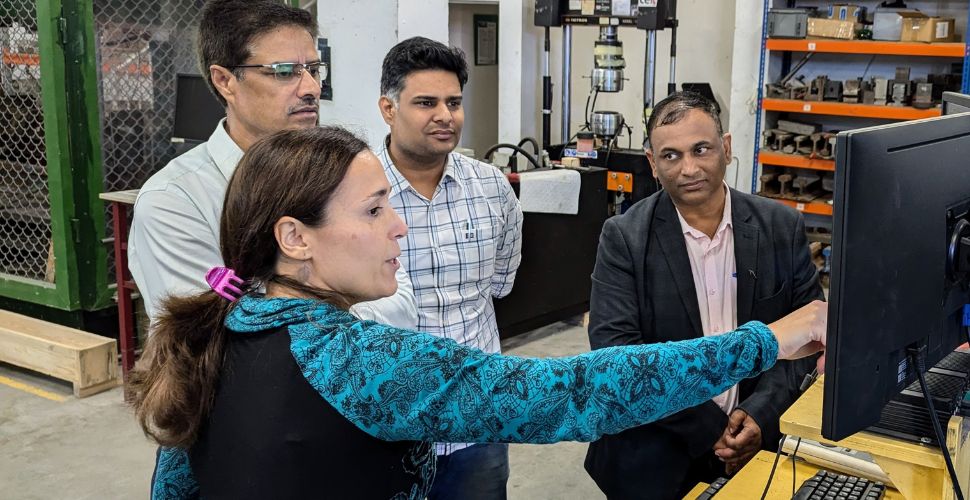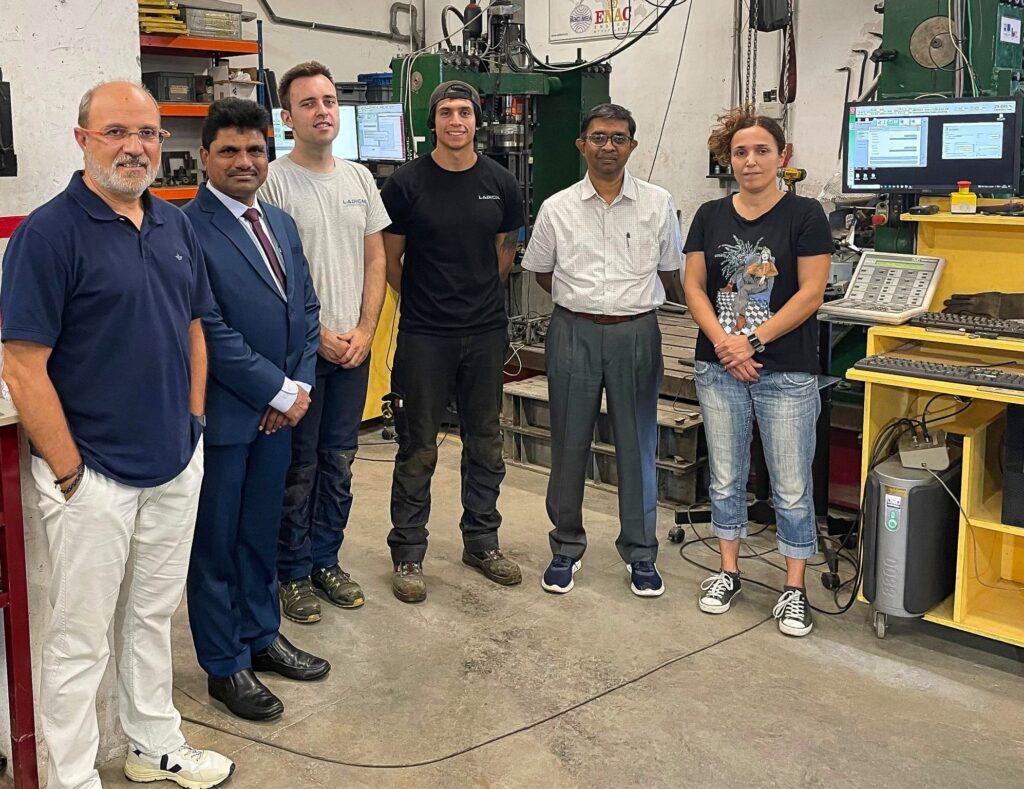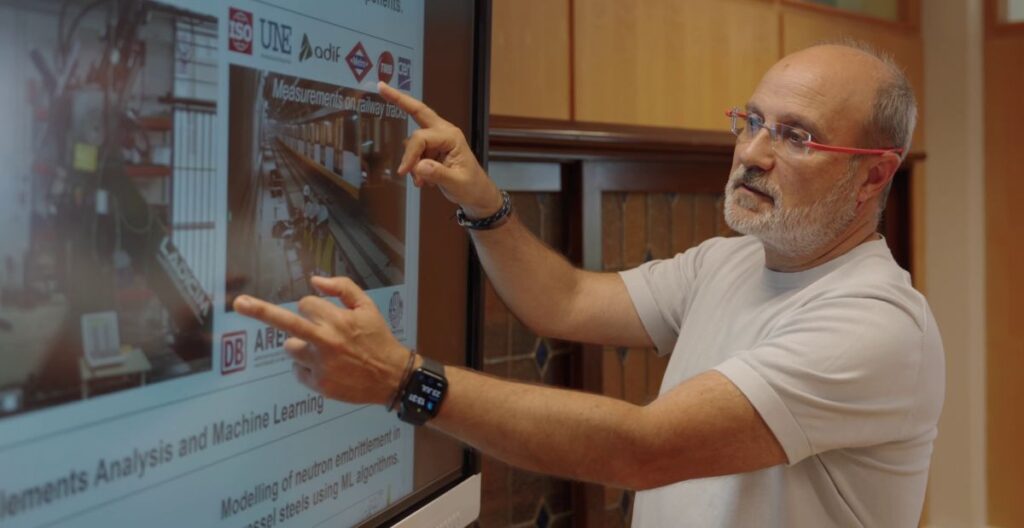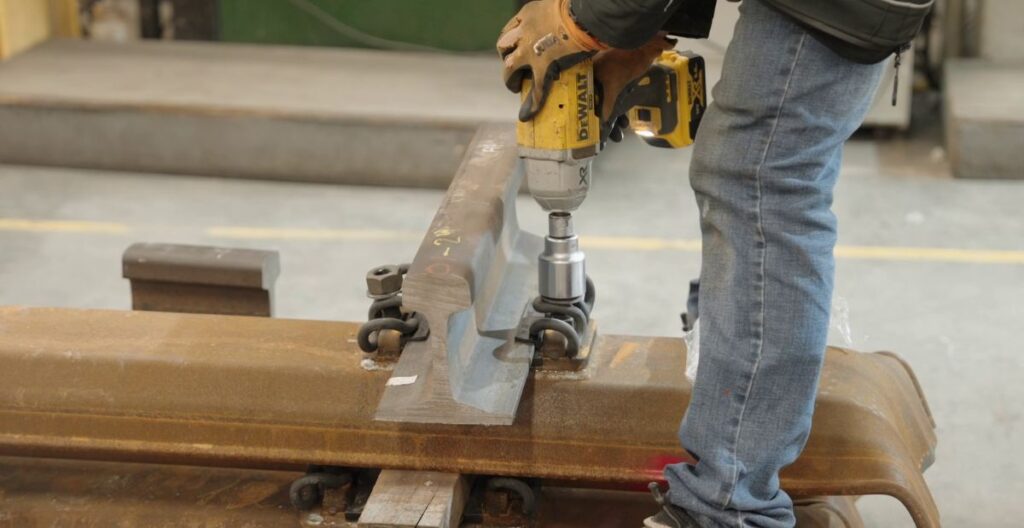
LADICIM Participates in the Development of Metropolitan Transport in India
The Laboratory of the Division of Materials Science and Engineering has renewed its collaboration agreement with Patil Rail, one of India’s leading companies specializing in the manufacturing of railway components.
The Laboratory of the Division of Materials Science and Engineering (LADICIM) at the University of Cantabria has strengthened its international position as a key technological partner in the development of metropolitan railway transport, particularly in India, where it currently provides advanced technical services to major companies in the sector. This collaboration has given a significant boost to the safety and efficiency of urban transport in some of the most densely populated cities in the world, such as Delhi, Mumbai, Chennai, Indore, and Bangalore.
In this context, LADICIM has recently renewed its collaboration agreement with Patil Rail, one of India’s leading companies specializing in the manufacturing of railway components, particularly advanced rail fastening systems. This agreement ensures that all components produced by Patil Rail strictly comply with international railway safety standards.
In addition to Patil Rail, LADICIM is currently collaborating in India with other prominent railway companies such as Pandrol Rahee Technologies, involved in major metro projects in Chennai, Bangalore, Kolkata, Delhi, Mumbai, and Indore; Carbonaire Industries, a specialist in the global distribution of railway equipment; and Mosdorfer India Private Limited, which is contributing to the development of the Chennai Metro. These collaborations, ongoing since 2022, further reinforce the technical relevance of the Cantabrian laboratory in supporting the development of safe and efficient railway infrastructure in one of the fastest-growing urban regions in the world.

The director of LADICIM, José Antonio Casado, highlights that the trust placed in them by major international companies such as Patil Rail confirms that “the knowledge generated in Cantabria can decisively contribute to the safe and sustainable development of urban and intercity rail transport in countries facing major mobility challenges, such as India.”
LADICIM’s contribution goes beyond laboratory testing. The University of Cantabria offers added value through highly specialized technical consultancy, carried out by a research team capable of delivering comprehensive solutions to the technical challenges of urban rail transport. In this regard, Soraya Diego, Head of LADICIM’s Railway Division, emphasizes: “What sets us apart is our ability to interpret, anticipate problems, and propose evidence-based technical improvements—something essential when working with urban transport systems in such demanding environments as India.”
The Laboratory’s international accreditation, granted by the International Laboratory Accreditation Cooperation (ILAC), further reinforces the confidence placed in it by Indian companies, who especially value LADICIM’s advanced interpretation of material behavior and construction solutions. Isidro Carrascal, Technical Director of the Laboratory, notes: “International accreditation is not just a mark of quality—it’s the result of decades of technical specialization and a commitment to excellence in the testing and certification of complex railway components.”
Over Three Decades of Innovation
LADICIM’s strategic collaboration in India is the result of a solid technological and scientific track record built over more than three decades. The Laboratory’s first work in railway superstructure dates back to the 1990s, when it began addressing technological challenges related to railway electrification by designing and developing insulating components made from advanced polymers. These early innovations served as a launchpad for establishing the Laboratory as a national benchmark in railway components.
Its position was significantly strengthened with the arrival of High-Speed Rail in Spain, particularly with the Madrid–Barcelona line. For over a decade, LADICIM worked closely with ADIF and other key players in the Spanish railway sector to redesign fastening and electrical insulation systems capable of withstanding speeds over 300 km/h, achieving the highest technical standards. This success earned LADICIM the Social Council Award from the University of Cantabria, recognizing its contributions to technological development in high-speed rail.
The prestige gained allowed LADICIM to expand internationally from 2015 onward, participating in one of the world’s most iconic railway projects: the monitoring and supervision of railway superstructure elements for the AVE line between Medina and Mecca. This experience marked a decisive milestone in the consolidation of its global standing.

The international expansion of the Laboratory is reflected in its presence in 25 countries around the world—from Canada, the United States, and Mexico to the United Arab Emirates, Turkey, Morocco, and Germany. This broad reach highlights the ability of its researchers to adapt to diverse international technical standards and to provide solutions tailored to the specific needs of each region.
€5.1 Million in the Last 5 Years
LADICIM’s international success is backed by its intense activity over the past five years, during which its Railway Superstructure research line has generated total revenues exceeding €5.1 million. Of this amount, €1.9 million came from publicly funded research projects (national and international, competitive or consortium-based), while €3.2 million corresponded to technology transfer projects, including agreements, contracts, and advanced technical services for companies in the railway sector.
These revenues represent 59% of LADICIM’s total economic volume during the same period, underscoring the strategic importance of the Railway Superstructure line for the Laboratory’s overall economic and technical sustainability.

The research and academic dimension also plays a key role in the growth of the Railway Superstructure Division, with over 70 scientific articles published, participation in more than 80 international conferences, and supervision of nine doctoral theses—five of which are industrial PhDs conducted in close collaboration with companies in the railway sector.
Additionally, LADICIM actively promotes specialized training, notably the Master’s Degree in Railway Engineering developed in partnership with the Spanish Railway Association (MAFEX), which attracts broad participation from professionals working at leading companies in the industry.
The recent renewal of the agreement with Patil Rail and the growing interest in new collaborations related to conventional tracks and potential applications in high-speed rail reflect the confidence placed in LADICIM’s technological and scientific potential—and, by extension, in the University of Cantabria’s international capacity for technology transfer.



